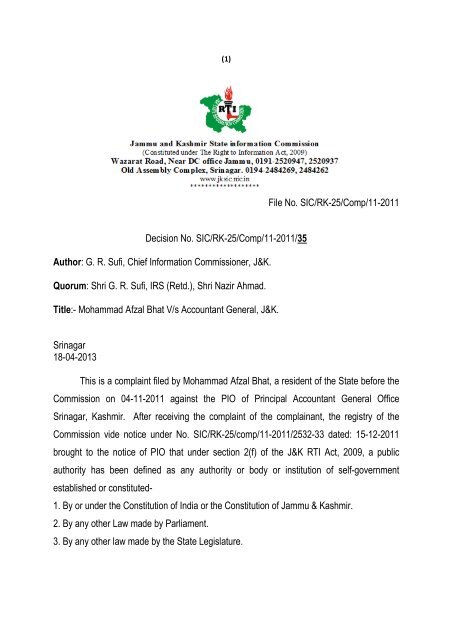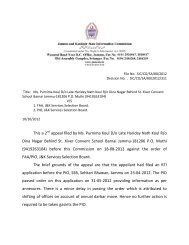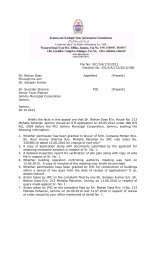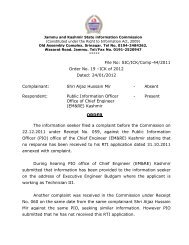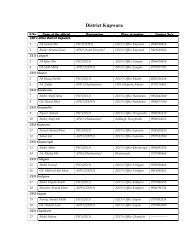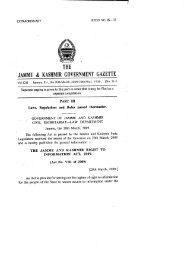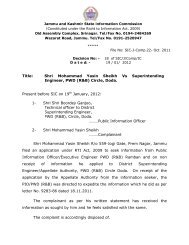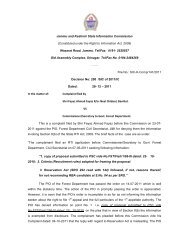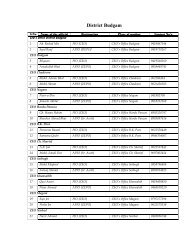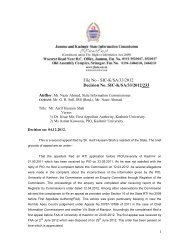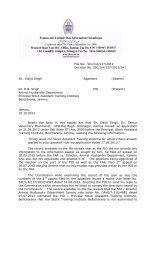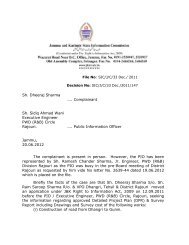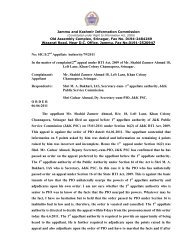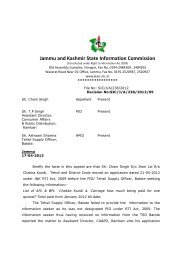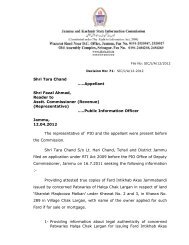SIC/RK-25/Comp/11-2011/35 - State Information Commission
SIC/RK-25/Comp/11-2011/35 - State Information Commission
SIC/RK-25/Comp/11-2011/35 - State Information Commission
You also want an ePaper? Increase the reach of your titles
YUMPU automatically turns print PDFs into web optimized ePapers that Google loves.
(1)<br />
File No. <strong>SIC</strong>/<strong>RK</strong>-<strong>25</strong>/<strong>Comp</strong>/<strong>11</strong>-20<strong>11</strong><br />
Decision No. <strong>SIC</strong>/<strong>RK</strong>-<strong>25</strong>/<strong>Comp</strong>/<strong>11</strong>-20<strong>11</strong>/<strong>35</strong><br />
Author: G. R. Sufi, Chief <strong>Information</strong> <strong>Commission</strong>er, J&K.<br />
Quorum: Shri G. R. Sufi, IRS (Retd.), Shri Nazir Ahmad.<br />
Title:- Mohammad Afzal Bhat V/s Accountant General, J&K.<br />
Srinagar<br />
18-04-2013<br />
This is a complaint filed by Mohammad Afzal Bhat, a resident of the <strong>State</strong> before the<br />
<strong>Commission</strong> on 04-<strong>11</strong>-20<strong>11</strong> against the PIO of Principal Accountant General Office<br />
Srinagar, Kashmir. After receiving the complaint of the complainant, the registry of the<br />
<strong>Commission</strong> vide notice under No. <strong>SIC</strong>/<strong>RK</strong>-<strong>25</strong>/comp/<strong>11</strong>-20<strong>11</strong>/<strong>25</strong>32-33 dated: 15-12-20<strong>11</strong><br />
brought to the notice of PIO that under section 2(f) of the J&K RTI Act, 2009, a public<br />
authority has been defined as any authority or body or institution of self-government<br />
established or constituted-<br />
1. By or under the Constitution of India or the Constitution of Jammu & Kashmir.<br />
2. By any other Law made by Parliament.<br />
3. By any other law made by the <strong>State</strong> Legislature.
(2)<br />
4. By any notification issued or order made by the Government and includes any---<br />
a) Body owned, controlled or substantially financed;<br />
b) Non Government organization substantially, financed, directly or indirectly by funds<br />
provided by the Government;<br />
Accordingly, the PIO was asked to dispose of the RTI application filed by the<br />
complainant as per the provisions of the Act. Subsequently, through another notice under<br />
No. <strong>SIC</strong>/<strong>RK</strong>-<strong>25</strong>/<strong>Comp</strong>/<strong>11</strong>-20<strong>11</strong>3<strong>35</strong>9-60 dated: 22-03-2012, the PIO was asked to appear<br />
before this <strong>Commission</strong> on 3 rd of April, 2012 along with the relevant documents. Howerver,<br />
the hearing for said date was rescheduled for 9 th of April, 2012. On 9 th of April, 2012, Shri<br />
S.A.Makroo, ASGI for Accountant General personally attended the <strong>Commission</strong> and<br />
submitted that the complainant had filed first appeal before the First Appellate Authority of<br />
Accountant General’s Office and accordingly, First Appellate Authority had directed for<br />
disclosure of information under the Central RTI Act, 2005. Therefore, it was requested that<br />
matter may be closed, treating the order of FAA for the disclosure of the information.<br />
However, the <strong>Commission</strong> noted that First Appellate Authority’s direction was that<br />
information be disclosed under RTI Act, 2005, i.e. Central RTI, Act and not under J&K RTI<br />
Act, 2009 under which Act the information was sought by information seeker. Therefore<br />
proceedings could not be closed. Shri Makroo requested that hearing may be adjourened<br />
for further three weeks time to enable him to submit a detailed rejoinder and counter<br />
statement. The plea for adjourement was granted vide <strong>Commission</strong> order dated: 09-04-<br />
2012. As the issue involved an important question of law, therefore on the<br />
recommendations of <strong>State</strong> <strong>Information</strong> <strong>Commission</strong>er Kashmir Division, Chief <strong>Information</strong><br />
<strong>Commission</strong>er vide order dated 06.08.2012, constituted a Division Bench comprising of<br />
Chief <strong>Information</strong> <strong>Commission</strong>er and <strong>State</strong> <strong>Information</strong> <strong>Commission</strong>er to hear and decide<br />
the complaint. The Division Bench heard the complaint on 30.08.2012.
(3)<br />
The respondent has objected to the applicability of J&K <strong>State</strong> RTI Act, 2009 to the<br />
Public Authority of Central Government on a number of reasons. The PIO, Shri Darshan Lal<br />
vide his written submissions has taken a plea that the then repealed rule 20(4) of J&K RTI<br />
Rules, 2010 required that the <strong>Commission</strong> with relevant data write to the Ministry concerned<br />
for taking measures to sensitise the officers of the department about their obligations under<br />
the Act and the ministers refered here mean only the <strong>State</strong> Minister who may sensitise the<br />
department functioning in J&K. It is further submitted that answering respondent is<br />
representing an independent entity in the Jammu & Kashmir <strong>State</strong> vis-a-vis <strong>Comp</strong>troller and<br />
Auditor General of India created under Constitution of India, and does not come under the<br />
control of any ministry in the Union Government or Jammu & Kashmir <strong>State</strong> Government.<br />
Therefore, the PIO contends that only such public authorities functioning in J&K <strong>State</strong> who<br />
are directly working under the control of <strong>State</strong> or alternatively are dependent on the<br />
proceeds drawn from the consolidated fund of the <strong>State</strong>, are governed by the J&K RTI Act,<br />
2009 and not those authorities which are reliant on the consolidated fund of India. In the<br />
same breath, the PIO has admitted that under section 5(1) of RTI Act, 2005, the <strong>Comp</strong>troller<br />
& Auditor General of India has designated the Group Officer in-charge of administration of<br />
the office of Accountant General (A&E), J&K, Srinagar as Public Informtion Officer (PIO)<br />
and in pursuance to said order the answering respondent is functioning as Central Public<br />
<strong>Information</strong> Officer (CPIO) of the office of Accountant General (A&E), Jammu & Kashmir,<br />
Srinagar. It is further stated that Central <strong>Information</strong> <strong>Commission</strong> is exercising its<br />
jurisdiction vis-vis, the office of Accountant General (A&E) Jammu & Kashmir Srinagar from<br />
abinitio and have heard and decided the complaints against the office of Accountant<br />
General (A&E), Jammu & Kashmir, Srinagar.<br />
It is also averred that for the PIOs representing Central Government in the<br />
jurisdiction of <strong>State</strong> of Jammu & Kashmir, it is the Central <strong>Information</strong> <strong>Commission</strong> which<br />
has the jurisdiction and Central <strong>Information</strong> <strong>Commission</strong> have heard and decided
(4)<br />
complaints under Central RTI Act, 2005 against the office of Accountant General (A&E),<br />
J&K. In this connection, reliance has been placed on the order passed by Central<br />
<strong>Information</strong> <strong>Commission</strong> in the case of S.N. Kangotra V/s Office of Accountant General<br />
(Case No. CIC/AT/C/2007/00139 dated: 31-01-2008). In its earlier rejoinder to<br />
<strong>Commission</strong>’s notice, bringing to the knowledge of respondents, section 2(f) of <strong>State</strong> RTI<br />
Act 2009, the respondent has stated that “Section (2) Chapter – I Preliminary of RTI Act<br />
(Central Act) does not extend to the <strong>State</strong> of J&K only in the sense that if there are Public<br />
Authorities under the control of <strong>State</strong> of J&K and located exclusively within the <strong>State</strong> of J&K<br />
and they hold information, then such information cannot be acceessed by filing application<br />
under RTI Act (Central RTI Act, 2005) with such Public Authority in the <strong>State</strong> of Jammu &<br />
Kashmir. The respondents have agreed that they fall within the jurisdiction of Central<br />
<strong>Information</strong> Act, 2005, thus contradicting their earlier stand that <strong>Comp</strong>troller & Auditor<br />
General, J&K being a constitutional authority, does not come under the purview of<br />
Transparency Laws i.e., Right to <strong>Information</strong> Act. Relying on Central <strong>Information</strong><br />
<strong>Commission</strong>’s another decision in the case of Ms. Veena Kohli V/s Ministry of Defence in<br />
the Appeal No. CIC/WB/C/2007/00636-SM dated: 20-05-2007, it is submitted that Central<br />
<strong>Information</strong> <strong>Commission</strong> has held that the Central RTI Act, 2005 is applicable to the <strong>State</strong> of<br />
J&K, so far as Central Government Establishments located in J&K are concerned. To<br />
butress its arguments, the respondent have also refered to Hon’ble Delhi High Court’s<br />
judgment dated: 03-02-2009, wherein the Hon’ble High Court upheld the decision of Central<br />
<strong>Information</strong>m <strong>Commission</strong> as referred above.<br />
The <strong>Commission</strong> has gone through the findings given by the Hon’ble Delhi High<br />
Court in the above decision. The Hon’ble Delhi High Court has rightly concurred with the<br />
view that under the <strong>State</strong> RTI Act, which is a separate enactment, there would be a<br />
<strong>Commission</strong> for the <strong>State</strong>. It is stated that section (2) of Chapter-I of Central RTI Act, which<br />
deals with the non application of Central Right to <strong>Information</strong> Act, 2005, to the <strong>State</strong>, simply
(5)<br />
means that no information can be sought under Central RTI Act from public authorities of<br />
J&K Government. However, with regard to the presence of Central authorities in the J&K,<br />
like defence forces etc. posted in the <strong>State</strong>, the simple and only question before the Hon’ble<br />
High Court was whether they were precluded from the operation of Central RTI Act in the<br />
<strong>State</strong>. The Hon’ble High Court has nowhere held that J&K <strong>State</strong> RTI Act is not applicable to<br />
the public authorities working in the J&K through their agents i.e number of officers holding<br />
number of positions and some among them have been designated as PIOs and FAAs. The<br />
respondent has further tried to emphasize that they do not come under the same law<br />
passed by Union Parliament and the <strong>State</strong> Legislature and if there is conflict between two<br />
laws it is central Act which will prevail. The <strong>Commission</strong> has deliberated upon this point and<br />
given due thought to this objection and have found that the PIO’s contentions are<br />
misplaced. First of all, there is broadly no conflict between the Central Act 2005 and the<br />
<strong>State</strong> RTI Act, 2009. Though it is an accepted constitutional position that in case of a clash<br />
between two laws passed by Union Parliament and the <strong>State</strong> Legislature on a particular<br />
subject which falls under the Concurrent List, it is the central law which will prevail.<br />
However, PIO is ignorant of special constitutional relationship of <strong>State</strong> of J&K with Union of<br />
India. The constitutional relationship of J&K with the Union of India is governed by Article-<br />
370 of Constitution of India. The <strong>State</strong> Legislature is functioning and deriving its powers<br />
from the Constitution of Jammu and Kashmir. It would be relevant to reproduce briefly the<br />
constitutional provisions contained in Article-370 which enumerates and prescribes the<br />
limitation for the powers of Union Parliament to make laws for <strong>State</strong> of J&K. It reads as<br />
under:-<br />
Notwithstanding anything in the constitution i.e Constitution of India,<br />
a) the provisions of article 238 shall not apply in relation to the <strong>State</strong> of Jammu<br />
and Kashmir;<br />
b) the power of Parliament to make laws for the said <strong>State</strong> shall be limited to-
(6)<br />
i. those matters in the Union list and the Concurrent List which, in<br />
consultation with the Government of the <strong>State</strong>, are declared by the<br />
President to correspond to matters specified in the Instrument of<br />
Accession governing the accession of the <strong>State</strong> to the Dominion of India<br />
as the matters with respect to which the Dominion Legislature may<br />
make laws for that <strong>State</strong>; and<br />
ii. such other matters in the said Lists as, with the concurrence of the<br />
Government of the <strong>State</strong>, the President may by order specify.<br />
Thus J&K <strong>State</strong> has a distinctive and distinguishable position in the Union of India in<br />
view of a special status conferred on it by Ariticle 370 of the Indian Constitution, hence the<br />
<strong>State</strong> Legislature legislates on the matters which other legislatures in the country do not<br />
legislate. Therefore, in accordance with this Constitutional Status, the <strong>State</strong> legislature in its<br />
judicial competence has passed <strong>State</strong> RTI Act, 2009 (Act VIII of 2009 dated: 30-03-2009)<br />
which has brought in its ambit <strong>State</strong> as well as Central Public Authorities working in the<br />
<strong>State</strong>.<br />
The CAG is a constitutional body and as such is a Public Authority, hence J&K <strong>State</strong><br />
RTI Act, 2009 is applicable to it. The <strong>State</strong> <strong>Information</strong> <strong>Commission</strong> is entrusted with the job<br />
of ensuring transparency and accountability in the working of every public authority in the<br />
<strong>State</strong> as enshrined in the preamble of J&K RTI Act 2009. The commission has to ensure<br />
that right to access the information given to citizens of the <strong>State</strong> as prescribed in section 3<br />
of <strong>State</strong> RTI Act is strictly implemented. Section 6 of <strong>State</strong> RTI Act elaborates that<br />
application can be made to concerned public authority and the concerned public authority<br />
has been defined in section 2(f) of <strong>State</strong> RTI Act as under:-<br />
(f)<br />
“public authority” means any authority or body or institution of selfgovernment<br />
established or constituted --<br />
(i) by or under the Constitution of India or the Constitution of Jammu and<br />
Kashmir;<br />
(ii) by any other law made by Parliament;<br />
(iii) by any other law made by the <strong>State</strong> Legislature;<br />
(iv) by notification issued or order made by the Government, and includes any-
(7)<br />
(A) body owned, controlled or substantially financed;<br />
(B) non-Government organization substantially financed, directly or<br />
indirectly by funds provided by the Government.<br />
The <strong>Commission</strong> has considered the submissions of the respondent and perused the<br />
records and gone through the Hon’ble Delhi High Court’s Decision relied upon by the<br />
respondent and also taken note of the decision given by the Central <strong>Information</strong><br />
<strong>Commission</strong>.At the outset, it is held with due respect, that the Central Inforamtion<br />
<strong>Commission</strong>’s decisions, instructions, etc are not binding on the <strong>State</strong> <strong>Information</strong><br />
<strong>Commission</strong>. The <strong>State</strong> <strong>Information</strong> <strong>Commission</strong> is the creation of J&K RTI Act, 2009.<br />
Section 12 of J&K RTI Act, 2009 provides for the constitution of a <strong>State</strong> <strong>Information</strong><br />
<strong>Commission</strong> which came into existence through a notification vide No.<br />
(SRO 3<strong>25</strong> dated<br />
19.10.2009). The <strong>State</strong> <strong>Information</strong> <strong>Commission</strong> derives its powers from the <strong>State</strong> RTI Act,<br />
2009. Like Central <strong>Information</strong> <strong>Commission</strong>, it is an autonomous quasi judicial authority,<br />
wherein Chief <strong>Commission</strong>er and <strong>Commission</strong>ers have been appointed by the Hon’ble<br />
Governor of the <strong>State</strong>. Thus the <strong>State</strong> <strong>Information</strong> <strong>Commission</strong> is a distinct and separate<br />
body from the Central <strong>Information</strong> <strong>Commission</strong>.<br />
Therefore, there is no dispute about the fact that <strong>Comp</strong>troller & Auditor General fall<br />
under the definition of public authority given in the <strong>State</strong> RTI Act, 2009, which is analogous<br />
and akin to definition given in the Central <strong>Information</strong> Act. Secondly, in both the Acts, there<br />
is no clash and conflict. With few variations and exceptions, the provisions of J&K RTI Act,<br />
2009 are the same as that of Central <strong>Information</strong> Act, 2005. Here in this case, it would be<br />
relevant to find the source of information which the complainant had sought. Nature of<br />
information as sought by the information seeker clearly shows that information so sought is<br />
in the posession of authorities of <strong>Comp</strong>troller & Auditor General’s office situated within<br />
territorial limits of J&K <strong>State</strong>. The <strong>Commission</strong> also declares that it has no objection that<br />
people may access information from the Central offices located in the territorial jurisdiction
(8)<br />
of J&K through Central RTI Act. But if any resident/residents of J&K <strong>State</strong> want to invoke<br />
J&K RTI Act, 2009 and seek information from the public authorities of Central Government<br />
functioning or acting within the territorial limits of the J&K <strong>State</strong> and if the information flows<br />
and originates within the territorial limits of J&K, same cannot be denied to him/them by<br />
stating that the <strong>State</strong> RTI Act, 2009 is not applicable to the central Government offices<br />
operating in the <strong>State</strong> of J&K.<br />
The respondents have nowhere rebutted that the J&K <strong>State</strong> Legislature has<br />
legislative competence to include public authorities established or constituted by or under<br />
the constitution of India or by any law made by Parliament in the definition of Public<br />
Authority in section 2 of the J&K RTI Act, 2009.The reference of the respondent to J&K RTI<br />
Rules, 2010 that there was no reference to <strong>State</strong> Appellate Authorities in those rules and<br />
thus by implication that means that the Act is not applicable to the respondents, is bereft of<br />
any merit. It is the substantive law, i.e., section 2(f) of J&K RTI Act, 2009 which has clearly<br />
brought all public authorities established by or under the constitution of India and by or<br />
under Act of Parliament which will prevail. Section 2 is part of substantive Law i.e., J&K<br />
<strong>State</strong> RTI Act, 2009. The omission in the rules, which is an executive act, cannot take away<br />
the right of a resident of the <strong>State</strong> to seek information from any central public authority<br />
constituted or established by the constitution of India or by any act of Parliament. It is<br />
worthwhile to mention that J&K <strong>State</strong> RTI Rules 2010 have since been repealed by<br />
replacing them with J&K RTI Rules 2012 which does not contain said referred Rule.<br />
In view of the above findings, the <strong>State</strong> <strong>Information</strong> <strong>Commission</strong> holds that CAG is a<br />
Public Authority as defined in Section 2(f) of the J&K RTI Act, 2009 operating within the<br />
territorial jurisdiction of <strong>State</strong> of J&K directly or through their subordinate offices posted<br />
within the territorial limits of J&K, thus fall under the purview of J&K RTI Act, 2009 in respect<br />
of information that flows and originates from records held by these Public Authorities within
(9)<br />
the state. The <strong>Commission</strong> therefore directs the concerned designated PIOs for the offices<br />
of CAG working in J&K <strong>State</strong> to receive applications from residents of J&K <strong>State</strong> under<br />
section 6 of the J&K RTI Act, 2009 and dispose them under section 7 of the said Act.<br />
Similarly, the designated First Appellate Authorities posted in the said offices are directed to<br />
receive and adjudicate appeal filed before them under section 16 of the J&K RTI Act, 2009.<br />
The complaint is accordingly disposed of.<br />
Sd/-<br />
(Nazir Ahmad)<br />
<strong>State</strong> <strong>Information</strong> <strong>Commission</strong>er<br />
Sd/-<br />
(G.R. Sufi)<br />
<strong>State</strong> Chief <strong>Information</strong> <strong>Commission</strong>er<br />
Copy to the: -<br />
1. <strong>Comp</strong>troller and Auditor General of India, 9, Deen Dayal Upadhyay Marg New<br />
Delhi -<strong>11</strong>0 124.<br />
2. Principal Accountant General (Audit) J&K, Jammu/Srinagar.<br />
3. Director <strong>Information</strong> J&K, Jammu/Srinagar.<br />
4. Sh. Mohammad Afzal Bhat r/o Gulposh Apartments, Quarter No. 13, Block B,<br />
Bemina, Srinagar.<br />
(Mohammad Shafi)<br />
Assistant Registrar,<br />
J&K <strong>State</strong> <strong>Information</strong> <strong>Commission</strong>


